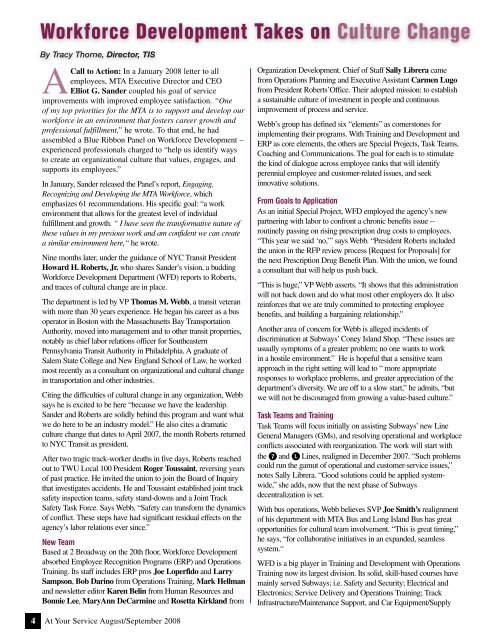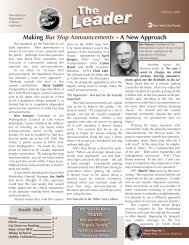September 11 Seven Years Later: Lest We Forget*
September 11 Seven Years Later: Lest We Forget*
September 11 Seven Years Later: Lest We Forget*
Create successful ePaper yourself
Turn your PDF publications into a flip-book with our unique Google optimized e-Paper software.
4<br />
Workforce Development Takes on Culture Change<br />
By Tracy Thorne, Director, TIS<br />
ACall to Action: In a January 2008 letter to all<br />
employees, MTA Executive Director and CEO<br />
Elliot G. Sander coupled his goal of service<br />
improvements with improved employee satisfaction. “One<br />
of my top priorities for the MTA is to support and develop our<br />
workforce in an environment that fosters career growth and<br />
professional fulfillment,” he wrote. To that end, he had<br />
assembled a Blue Ribbon Panel on Workforce Development –<br />
experienced professionals charged to “help us identify ways<br />
to create an organizational culture that values, engages, and<br />
supports its employees.”<br />
In January, Sander released the Panel’s report, Engaging,<br />
Recognizing and Developing the MTA Workforce, which<br />
emphasizes 61 recommendations. His specific goal: “a work<br />
environment that allows for the greatest level of individual<br />
fulfillment and growth. “ I have seen the transformative nature of<br />
these values in my previous work and am confident we can create<br />
a similar environment here,“ he wrote.<br />
Nine months later, under the guidance of NYC Transit President<br />
Howard H. Roberts, Jr. who shares Sander’s vision, a budding<br />
Workforce Development Department (WFD) reports to Roberts,<br />
and traces of cultural change are in place.<br />
The department is led by VP Thomas M. <strong>We</strong>bb, a transit veteran<br />
with more than 30 years experience. He began his career as a bus<br />
operator in Boston with the Massachusetts Bay Transportation<br />
Authority, moved into management and to other transit properties,<br />
notably as chief labor relations officer for Southeastern<br />
Pennsylvania Transit Authority in Philadelphia. A graduate of<br />
Salem State College and New England School of Law, he worked<br />
most recently as a consultant on organizational and cultural change<br />
in transportation and other industries.<br />
Citing the difficulties of cultural change in any organization, <strong>We</strong>bb<br />
says he is excited to be here “because we have the leadership.<br />
Sander and Roberts are solidly behind this program and want what<br />
we do here to be an industry model.” He also cites a dramatic<br />
culture change that dates to April 2007, the month Roberts returned<br />
to NYC Transit as president.<br />
After two tragic track-worker deaths in five days, Roberts reached<br />
out to TWU Local 100 President Roger Toussaint, reversing years<br />
of past practice. He invited the union to join the Board of Inquiry<br />
that investigates accidents. He and Toussaint established joint track<br />
safety inspection teams, safety stand-downs and a Joint Track<br />
Safety Task Force. Says <strong>We</strong>bb, “Safety can transform the dynamics<br />
of conflict. These steps have had significant residual effects on the<br />
agency’s labor relations ever since.”<br />
New Team<br />
Based at 2 Broadway on the 20th floor, Workforce Development<br />
absorbed Employee Recognition Programs (ERP) and Operations<br />
Training. Its staff includes ERP pros Joe Loperfido and Larry<br />
Sampson, Bob Darino from Operations Training, Mark Hellman<br />
and newsletter editor Karen Belin from Human Resources and<br />
Bonnie Lee, MaryAnn DeCarmine and Rosetta Kirkland from<br />
At Your Service August/<strong>September</strong> 2008<br />
Organization Development. Chief of Staff Sally Librera came<br />
from Operations Planning and Executive Assistant Carmen Lugo<br />
from President Roberts’Office. Their adopted mission: to establish<br />
a sustainable culture of investment in people and continuous<br />
improvement of process and service.<br />
<strong>We</strong>bb’s group has defined six “elements” as cornerstones for<br />
implementing their programs. With Training and Development and<br />
ERP as core elements, the others are Special Projects, Task Teams,<br />
Coaching and Communications. The goal for each is to stimulate<br />
the kind of dialogue across employee ranks that will identify<br />
perennial employee and customer-related issues, and seek<br />
innovative solutions.<br />
From Goals to Application<br />
As an initial Special Project, WFD employed the agency’s new<br />
partnering with labor to confront a chronic benefits issue -routinely<br />
passing on rising prescription drug costs to employees.<br />
“This year we said ‘no,’” says <strong>We</strong>bb. “President Roberts included<br />
the union in the RFP review process [Request for Proposals] for<br />
the next Prescription Drug Benefit Plan. With the union, we found<br />
a consultant that will help us push back.<br />
“This is huge,” VP <strong>We</strong>bb asserts. “It shows that this administration<br />
will not back down and do what most other employers do. It also<br />
reinforces that we are truly committed to protecting employee<br />
benefits, and building a bargaining relationship.”<br />
Another area of concern for <strong>We</strong>bb is alleged incidents of<br />
discrimination at Subways’ Coney Island Shop. “These issues are<br />
usually symptoms of a greater problem; no one wants to work<br />
in a hostile environment.” He is hopeful that a sensitive team<br />
approach in the right setting will lead to “ more appropriate<br />
responses to workplace problems, and greater appreciation of the<br />
department’s diversity. <strong>We</strong> are off to a slow start,” he admits, “but<br />
we will not be discouraged from growing a value-based culture.”<br />
Task Teams and Training<br />
Task Teams will focus initially on assisting Subways’ new Line<br />
General Managers (GMs), and resolving operational and workplace<br />
conflicts associated with reorganization. The work will start with<br />
the 7 and L Lines, realigned in December 2007. “Such problems<br />
could run the gamut of operational and customer-service issues,”<br />
notes Sally Librera. “Good solutions could be applied systemwide,”<br />
she adds, now that the next phase of Subways<br />
decentralization is set.<br />
With bus operations, <strong>We</strong>bb believes SVP Joe Smith’s realignment<br />
of his department with MTA Bus and Long Island Bus has great<br />
opportunities for cultural team involvement. “This is great timing,”<br />
he says, “for collaborative initiatives in an expanded, seamless<br />
system.“<br />
WFD is a big player in Training and Development with Operations<br />
Training now its largest division. Its solid, skill-based courses have<br />
mainly served Subways; i.e. Safety and Security; Electrical and<br />
Electronics; Service Delivery and Operations Training; Track<br />
Infrastructure/Maintenance Support, and Car Equipment/Supply



